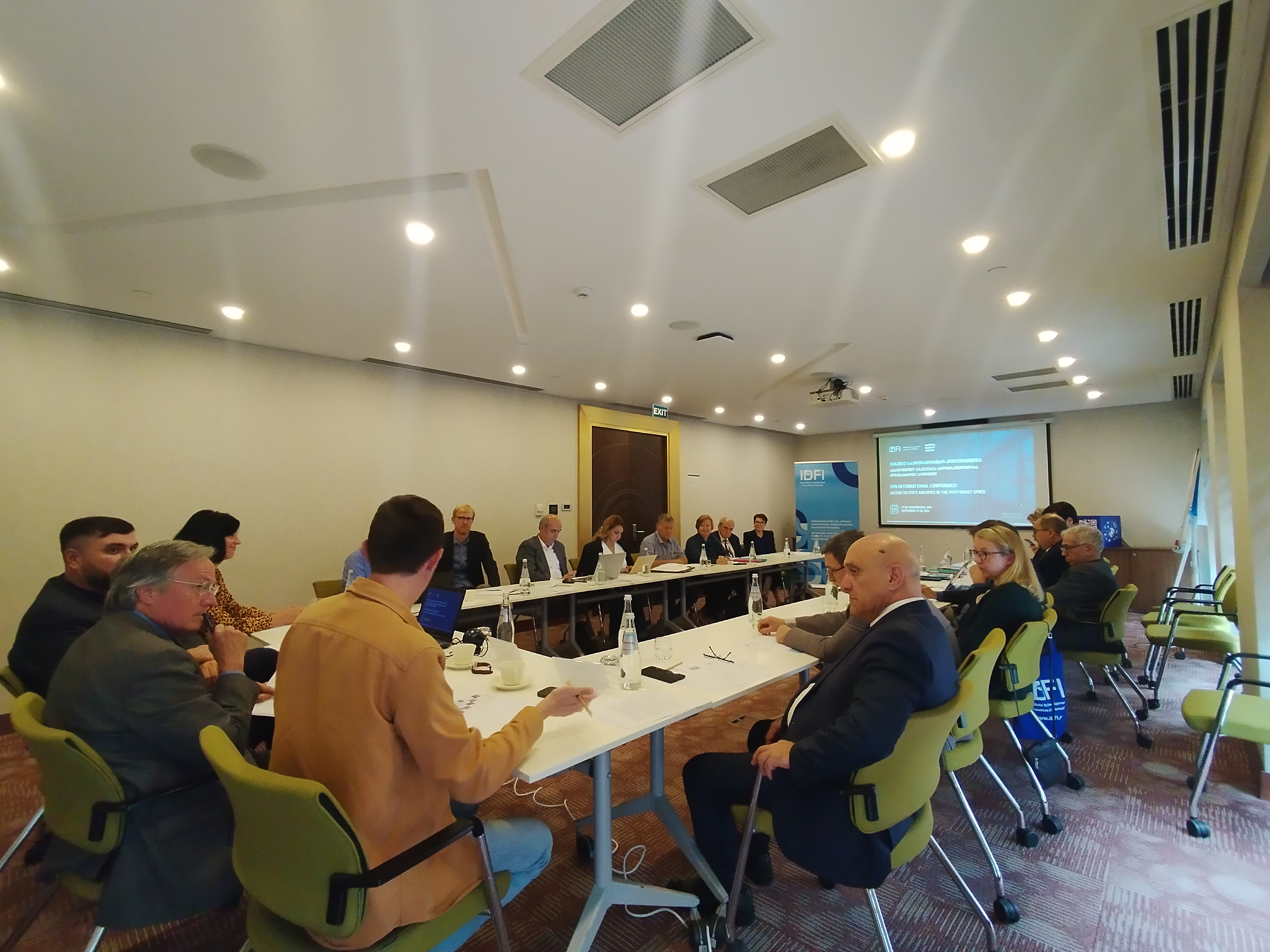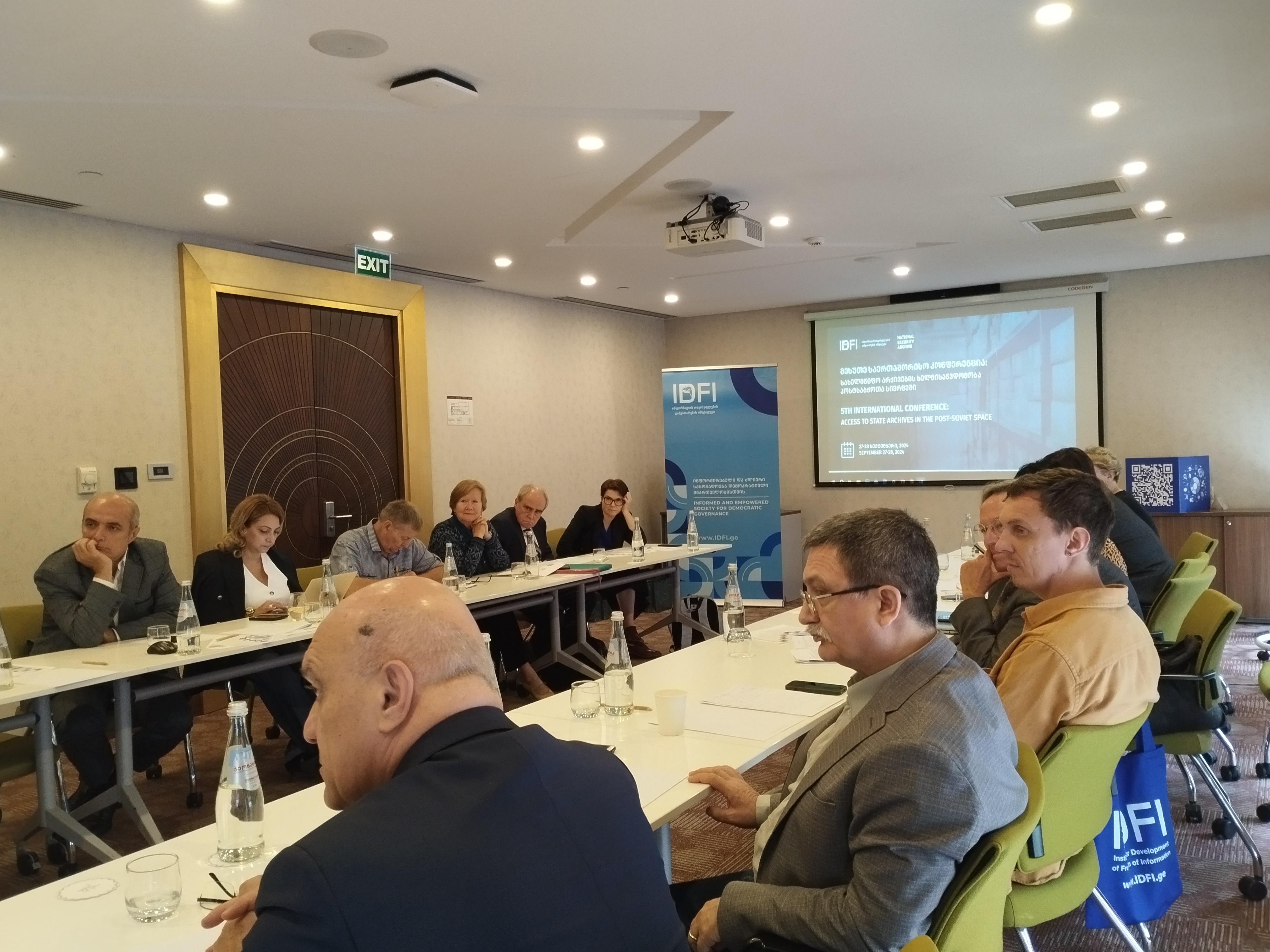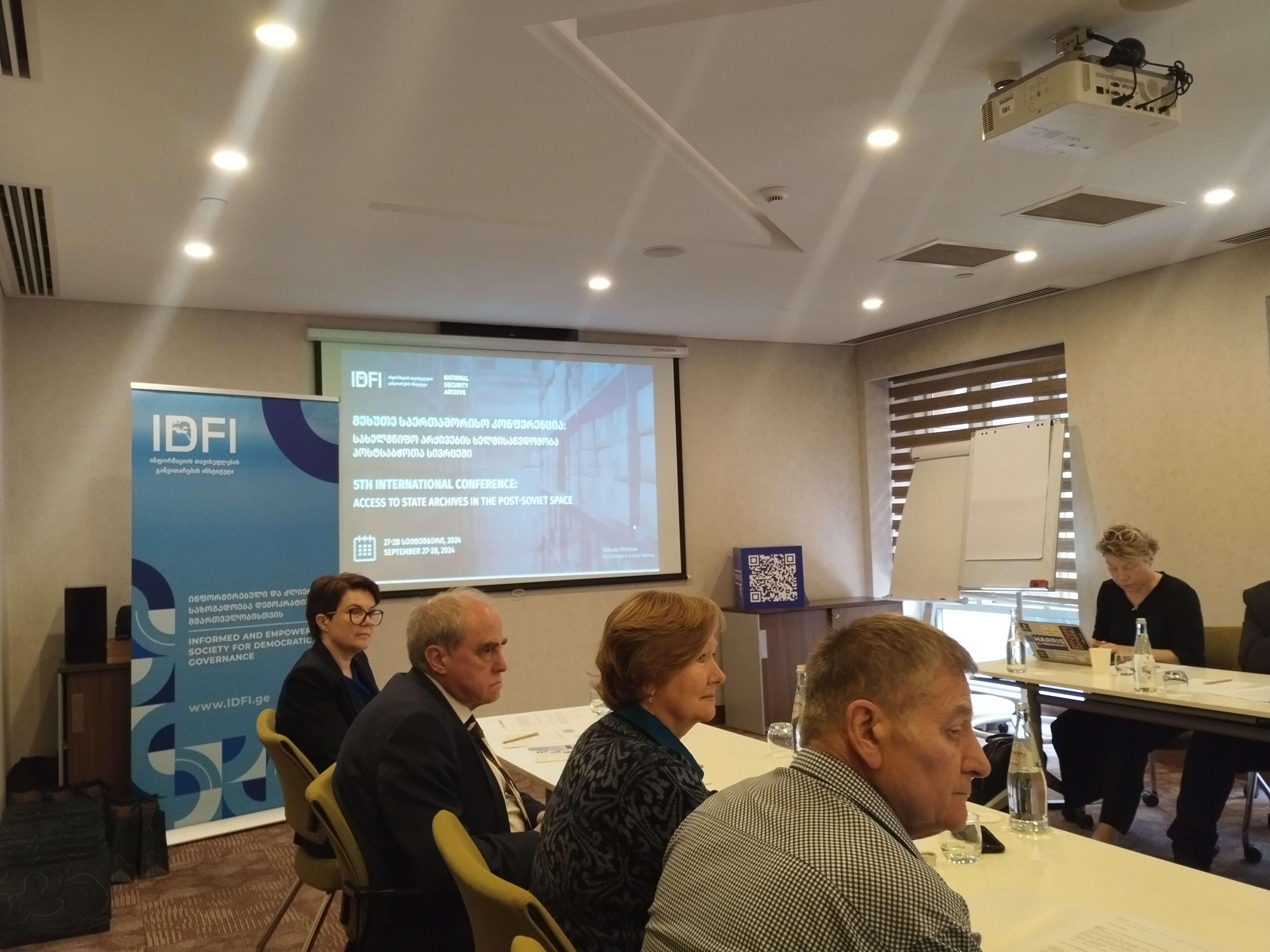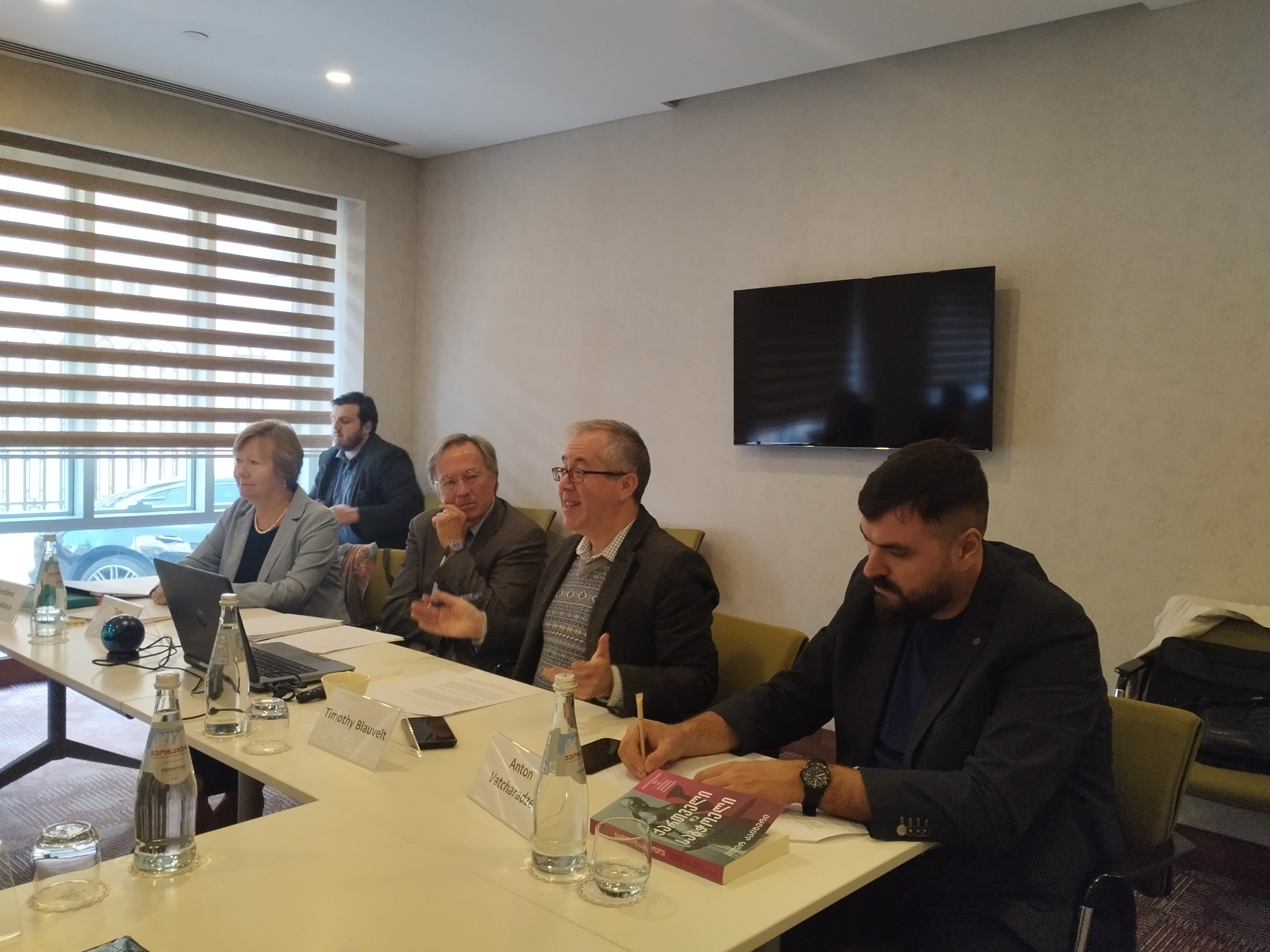


'Effective Democratization can always be measured by access to the archive.”
Jacques Derrida
 On September 27-28, the Institute for the Development of Freedom of Information (IDFI), with financial support from the National Security Archive (NSA) at George Washington University and the Swedish International Development Cooperation Agency (Sida), hosted the 5th International Conference - "Access to State Archives in the Post-Soviet Space".
On September 27-28, the Institute for the Development of Freedom of Information (IDFI), with financial support from the National Security Archive (NSA) at George Washington University and the Swedish International Development Cooperation Agency (Sida), hosted the 5th International Conference - "Access to State Archives in the Post-Soviet Space".
The conference brought together Georgian and international experts to discuss issues related to access to archives, memory policies, best practices, the future of archives in post-Soviet countries, and solutions to the challenges in these areas. Special attention was given to the limitations imposed on archival activities in Georgia and the attempt to establish state control over historical research.
Historians, researchers, and experts from various countries, who have been working for years on critical issues related to historiography and memory studies, participated in the conference.
The event was opened by Anton Vatcharadze, Head of IDFI's Memory and Disinformation Studies Direction, and Tom Blanton, Director of the National Security Archive (NSA).
Anton Vatcharadze highlighted Georgia's significant challenges regarding freedom of information, particularly concerning the openness of archives. He noted that one of the conference's main objectives was to share the experiences of countries with exemplary practices. This is especially relevant considering that the archive of the Ministry of Internal Affairs, crucial for studying the Soviet past, has been closed for almost a year due to "technical issues".
Tom Blanton emphasized the importance of holding the conference during a particularly challenging period for IDFI and other non-governmental organizations working with state archives. He described the event as a symbolic declaration that "we are here" to discuss archival openness, bringing together representatives from different countries to tackle these issues under the principle of freedom of information.
Each day of the conference featured three discussion panels.

On September 27, the first panel, "Restricted Openness of State Archives in Georgia: The Emergence of State Control Over Historical Policy", was chaired by Anton Vacharadze. Historian Sarah Slye presented the growing authoritarianism in Georgia’s higher education and research sectors and the impact of the ongoing war in Ukraine. Nini Gogiberidze, Project Manager of the Soviet Past Research Laboratory, discussed restrictions imposed by the Georgian government on Soviet-era archives and highlighted the role of Russian disinformation. Historian Vitaliy Shtybin reflected on his experiences working in Georgian archives from 2022 to 2024, outlining the challenges and trends.
The second panel, "Best Practices for Archive Openness in Eastern European Countries", was led by Andrea Gullotta, Senior Researcher at the University of Palermo and Co-Chair of the International Memorial Association, successor to the Nobel Peace Prize-winning International Memorial.
During this session, Czech parliamentarian and historian Pavel Zacek discussed memory policy and archival access in the Czech Republic. Historian Henrik Bispinck focused on the history, access, and use of Stasi files. At the same time, Wanda Jarzabek, Assistant Professor in the German Studies Department at the Institute for Political Studies of the Polish Academy of Sciences, explored how the transition period of 1989-1991 influenced access to state archives in Poland.
 The third panel, "Archival Access in Post-Soviet States: Legal Frameworks, Challenges, and Political Influences", was moderated by Iryna Ramanava, Professor at the European Humanities University (EHU) in Vilnius, Lithuania. Professor Andriy Kudryachenko, Director of the Institute of World History at the National Academy of Sciences of Ukraine, discussed the specifics of working in Ukrainian archives. Eldar Zeynalov, a human rights defender and journalist from Azerbaijan, examined how political motives influence access to archives in Russia and CIS countries. Levon Barseghyan, Founder and Chairman of the Gyumri Journalists' Club "Asparez," covered the regulation of freedom of information and local government practices in Armenia. A representative from Uzbekistan provided insights into the state of archival access in the country, including legal frameworks and current practices.
The third panel, "Archival Access in Post-Soviet States: Legal Frameworks, Challenges, and Political Influences", was moderated by Iryna Ramanava, Professor at the European Humanities University (EHU) in Vilnius, Lithuania. Professor Andriy Kudryachenko, Director of the Institute of World History at the National Academy of Sciences of Ukraine, discussed the specifics of working in Ukrainian archives. Eldar Zeynalov, a human rights defender and journalist from Azerbaijan, examined how political motives influence access to archives in Russia and CIS countries. Levon Barseghyan, Founder and Chairman of the Gyumri Journalists' Club "Asparez," covered the regulation of freedom of information and local government practices in Armenia. A representative from Uzbekistan provided insights into the state of archival access in the country, including legal frameworks and current practices.
On September 28, the first panel, a roundtable discussion on "Issues of Archival Access", was chaired by Timothy Blauvelt, Associate Professor of Soviet and Post-Soviet Studies at Ilia State University. Panelists included Claire P. Kaiser (Assistant Professor, Center for Eurasian, Russian and East European Studies, Georgetown University), Kristine Barseghyan (Ph.D. candidate at the Graduate School for Social Research, director of the public organization "Investigative Journalists", Armenia), Anton Vatcharadze, Svetlana Savranskaya, and Tom Blanton.

The second panel, "Challenges and Controversies in Russian Archival Openness: Historical Policy, Access, and Manipulation", was moderated by Svetlana Savranskaya, Director of Russian Programs at the George Washington University NSA. Savranskaya recalled viewing significant documents in Georgian archives in 2011, including personal documents of Eduard Shevardnadze and Zviad Gamsakhurdia, and expressed concern over the worsening situation in Georgia. Jan Rachinsky, Chairman of the Nobel Peace Prize-winning International Memorial, spoke about the deterioration of archival access in Russia under its current historical policy. He emphasized that materials previously available in the archives during the 1990s are either no longer accessible or extremely difficult to obtain. In Russia, a concept of "sacred history" is being developed, which diverges significantly from scientific approaches and is rooted in the glorification and sacralization of the past.
Peter Ruggenthaler, Deputy Head of the Ludwig Boltzmann Institute, reported on the openness of state archives in Russia, using RGANI as a case study. Andrea Gullotta also discussed the archives and Sandormokh case.
The third panel, "Memory and Access: Navigating Archival Challenges", was chaired by Tom Blanton, Director of the National Security Archive at George Washington University and recipient of the 2004 Emmy Award for Individual Achievement in News and Documentary Research. Professor Iryna Ramanava discussed the accessibility of Belarusian archives, while journalist Ashot Melikyan addressed the state of freedom of information in Armenia. Political scientist Dr. Parviz Mullojonov, former Chairman of the Open Society Institute's Tajikistan branch, presented on the challenges of archival development and historical memory in Tajikistan.
Throughout the conference, participants emphasized the importance of digitizing archives and enhancing public accessibility. The conference concluded with a commitment to continue advocating for the openness of archives across participating countries.